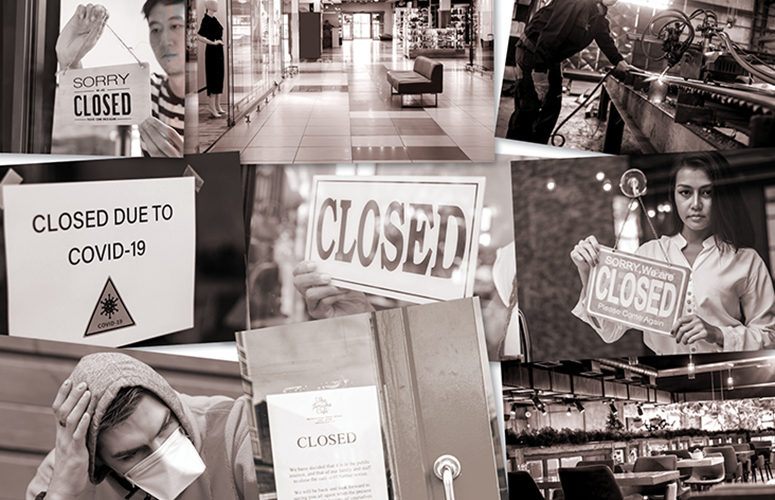
Businesses Battle Through COVID-19
Assistance, solutions and assurances: A review of programs, initiatives and coping strategies in this challenging time.
By Lisa Goulian Twiste, Contributing Writer On Apr 29, 2020Many New Jersey businesses are bracing for a long, hard battle in the wake of COVID-19. Some will not survive, especially those non-essential businesses forced to shut down completely for weeks on end. Many of those that do weather the storm will need to make up for lost revenue as they attempt to make ends meet and rebuild.
“The outbreak of the novel coronavirus in New Jersey has sent us into uncharted territory, and the economic impacts will be significant and far-reaching, especially on Main Street,” said Gov. Phil Murphy, whose Executive Order No. 107, signed on March 21, directed residents to stay at home, and ordered the closure of all non-essential retail businesses.
Meanwhile, most small businesses – defined as companies with fewer than 500 employees – have very low cash buffers (about 26 days of cash reserve, on average), which has led to unprecedented layoffs.
According to New Jersey Department of Labor and Workforce Development (DOL) Commissioner Robert Asaro-Angelo, there was a 1,600% increase in unemployment claims during the first week of the pandemic. Between March 15 and April 4, a total of 576,904 people applied for unemployment benefits in the state. Nationwide filings stood at 16.8 million for the same time period, plunging the nation into new depths.
“As we speak, small business owners are looking at an unfortunate numbers game,” says Michele Siekerka, president and CEO of the New Jersey Business & Industry Association (NJBIA). “Thousands of them in New Jersey have millions of legitimate concerns about how long, or if, their businesses can survive with zero revenue coming in.”
According to Al Titone, district director for the U.S. Small Business Administration’s New Jersey District Office, all sectors have been affected, but the hardest hit businesses are those in the service industry, such as restaurants, hotels/motels, hair and nail salons, day care centers, small retailers, medical practices and independent trucking companies.
“The more resilient businesses during this time are small grocery stores, medical supply stores, high-tech services and high-tech manufacturing,” Titone says. “However, with consumer spending habits changing drastically, there are not many industries that have gone unscathed by the effects of the coronavirus.”
Among the many businesses being negatively impacted is Atlantic Bar & Grill in Seaside Park. According to Mike Jurusz, chef and owner, last year was the restaurant’s best since 2004, and after its usual one-month closure in January, it had an even better month of February than in 2019. Then, Jurusz says, the bottom fell out. “We knew something was coming down the pike, but still, it was so sudden,” says Jurusz, who is known as “Chef Mike” in his Jersey Shore community. “There are people who have been with me so long, who have depended on me, and the fact that I cannot provide for them anymore absolutely destroys me.”
Jurusz tried to offer takeout, and even though there was a huge outpouring from regular customers, it wasn’t a good fit for the restaurant’s fine dining style. Now Jurusz sits and waits, hoping he’ll have the resources to reopen when Gov. Murphy lifts the stay-at-home order.
“I can probably survive April, but then I’m going to be dried out – done,” he says.
Programs to Help
There are more than 860,000 small businesses in New Jersey trying to navigate this crisis, but as plentiful as the obstacles are, so are the avenues for relief. The $2.2-trillion Coronavirus Aid, Relief, and Economic Security (CARES) Act signed by President Trump on March 27, earmarked $350 billion for SBA Paycheck Protection Program (PPP) loans. According to the SBA, if a small business keeps all employees on its payroll for eight weeks and the PPP money is used for payroll, rent, mortgage interest, or utilities, the loan will be forgiven.
“This is huge, as it will give businesses money to bridge the gap and get past this period of economic shutdown,” says Dan Mayo, national tax policy lead at accounting and advisory firm Withum in Whippany. “This will help bridge the gap from the current crisis to a normal business environment.” (Note: at press-time, the PPP has been depleted and is currently awaiting refunding approval by Congress).
Other provisions of the stimulus include a 50% refundable payroll tax credit on worker wages aimed at reducing employee layoffs; a loosening of net operating loss deduction rules to allow businesses to obtain tax refunds; a delay in employer-side payroll taxes for Social Security until 2021 and 2022; and expanded unemployment insurance benefits for sole proprietors and other self-employed workers. The legislation also sets aside a portion of the $425 billion in funds appropriated for the Federal Reserve’s credit facilities for small businesses.
In addition, the SBA has been offering low-interest Economic Injury Disaster Loans of up to $2 million to help with working capital needs directly resulting from COVID-19. Another component to this program is an advance of up to $10,000, which Titone says “will provide economic relief to businesses that are currently experiencing a temporary loss of revenue.”
Among other programs, Murphy and the DOL announced that employers will be eligible for a dollar-for-dollar federal payroll tax credit against costs incurred in keeping employees on their payrolls. “This is available to 99.8% of businesses in New Jersey,” Murphy says. “We cannot urge employers enough to keep their workers on payroll throughout this crisis.”
The payroll tax credit will be provided under the Families First Coronavirus Response Act (FFCRA). The federal law, which went into effect April 1, provides support to employers to provide federal Emergency Paid Sick Leave and Emergency Paid Family and Medical Leave to workers affected by COVID-19.
Aid is also available to businesses from state programs.
In late March, the New Jersey Economic Development Authority introduced a $75-million package (state and private financial support) of initiatives including the Small Business Emergency Assistance Grant Program in which $5 million is available for businesses negatively impacted by the pandemic. In this program, business with 10 employees or less are eligible for up to $5,000.
The other initiative, titled the Small Business Emergency Assistance Loan Program, is a zero-interest loan product in which up to $100,000 is available to eligible companies with under $5 million in revenues.
Though both programs were oversubscribed the same day applications were accepted, businesses are recommended to still apply because the NJEDA is expected to come back to the queue with future funding from federal and philanthropic resources.
According to NJEDA CEO Tim Sullivan, “Small- and medium-sized enterprises are the heartbeat of New Jersey’s economy, and it is crucial that we do what we can to provide the resources and assistance they need to withstand the outbreak of the novel coronavirus. These are challenging times, but New Jerseyans are resilient, and together we will get through this and rebuild our economy.”
Additionally, on March 15, Murphy announced the creation of www.cv.business.nj.gov, an online portal where businesses can find answers to various questions and concerns. Information on the most recent guidance directives from the state, links to economic assistance programs, benefits for impacted individuals, guidance for employers, general information on COVID-19, and more can be found on the site.
Meanwhile, members of the New Jersey Bankers Association are considering coronavirus-related financial hardships on a case-by-case basis. According to John E. McWeeney, Jr, president and CEO of the association, banks are: allowing principal and interest deferral for affected businesses for 90 days; waiving overdraft, early CD withdrawal, and sweep fees; increasing lines of credit; and are assisting with SBA disaster relief loans and small business grants, among other initiatives.
Tough Decisions for Businesses
As these programs continue to roll out, business owners struggling to address their employee count and payroll costs can consider three options: (1) retain all employees; (2) furlough employees; or (3) lay off employees.
Michael A. Shadiack, Esq., chairperson of the Labor & Employment Practice Group at Connell Foley LLP in Roseland, says the guidance he is providing to businesses has evolved in recent weeks as new legal authority has been issued. “There are no boilerplate answers that can be provided to an employer relative to its personnel decisions while addressing the current pandemic,” he says. “Every employer’s situation is different when determining whether to retain, furlough or lay off employees.”
Those keeping their staffs in place are only required by law to pay non-exempt employees for hours worked. At the same time, exempt employees who work even one hour a week need to be paid for the entire week, unless their hours and corresponding pay are reduced with fair warning and justified by a legitimate business reason (i.e., business slowdown). Also, an exempt employee’s pay cannot drop below the minimum of $684 a week mandated by federal law.
With a furlough, employees are placed on unpaid leave for a designated period of time and can apply for unemployment benefits and health coverage under COBRA – though some insurance carriers are continuing to cover furloughed workers because of the extreme circumstances created by COVID-19. With a layoff, employees no longer work for the company and can seek unemployment insurance from the state of New Jersey and elect continuation of healthcare coverage through COBRA. Those with unionized employees must consider any collective bargaining agreement and whether there are layoff and severance provisions, and all employers should look at the federal WARN Act and New Jersey’s “Mini” WARN Act, both of which currently require 60 days notice to impacted employees before a layoff.
For those employers considering a layoff, Shadiack says they should look at where they will be after the crisis and decide whether they will need the same number of workers. There may be a decreased demand for their products or services, or they may realize they can work more efficiently with fewer employees and a lesser payroll.
Conclusion
Overall, NJBIA’s Siekerka says, “During these extraordinary times, businesses and nonprofit organizations are putting health, welfare and safety of the workforce, its customers and supply chains at the forefront, while also realizing the unprecedented financial hardships the spread of the coronavirus is having on their ability to keep operations afloat and workers employed.”
She says that, as the pandemic continues, “It is paramount that we address the next round of critically needed policy; initiatives that will continue to bring relief to our job creators and our workforce, while also looking at what will be needed for New Jersey’s economy to recover at a rapid pace. The urgency to bring relief cannot be understated.”
According to Titone, “This will be a learning experience for New Jersey’s small business owners, who will ask themselves what they can do to make their business model stronger if ever again faced with a crisis of this magnitude. For a small business, that’s the difference between survival and closing your doors.”
NJIT Concentrates on Graduating Seniors and Distance Learning
President Bloom focuses on “the economy for future students, current students and what they’re going to face.”
New Jersey is home to 47 four-year colleges and universities – all of which have been conducting classes and other services exclusively online since the second week of March. This has been particularly challenging for the New Jersey Institute of Technology (NJIT), the state’s public polytechnic university with a heavy STEM concentration and whose research center and laboratories are normally teeming with students.
“At the undergraduate level, any science and technology education is very lab focused,” says NJIT President Dr. Joel Bloom. “Some can be done through simulation and virtually, but you’re going to lose that hands-on opportunity for students.”
However, failure to complete all labs and other coursework will not keep NJIT seniors from graduating on time, according to Bloom. The administration, which has been providing computers and interactive cameras to students for home use at an unprecedented rate, will work with seniors to figure out ways they can meet their requirements.
Of bigger concern is the job market going forward. Although as many as 75% of NJIT seniors have a job waiting for them because of high demand in the STEM fields, Bloom is concerned about unemployment rates, which he believes may multiply 8- to 10-fold because of COVID-19. And while he doesn’t think the pandemic will affect the number of students in the incoming freshman class (the college normally receives more than 10,000 applications for 1,400 slots), it will most likely limit students from out of the country who may face issues getting visas.
“We’re going to be very focused on the economy for future students, current students and what they’re going to face,” Bloom says. “Economically, it took us 10 years to recover from the last recession, with New Jersey unemployment rates falling below five percent only in the last couple of years. There are lots of unknowns, so we have to look around the corner, look ahead, be optimistic, and be smart.”
To access more business news, visit NJB News Now.
Related Articles:






